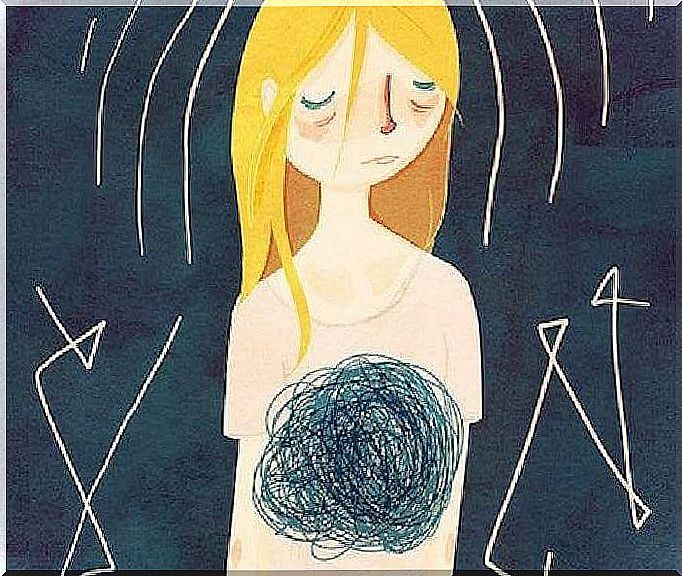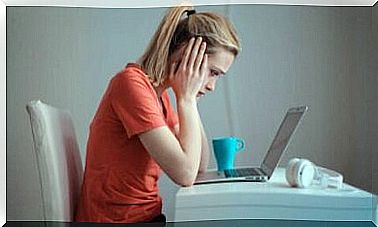That Knot In My Stomach, The Black Hole Of My Anxiety

Sometimes life settles there, in the epicenter of our body, like a ball that takes away the air, hunger and desire right in the stomach. They are not butterflies, it is the black hole of anxiety that traps everything and consumes everything, like a known enemy, at times ungovernable that accelerates life, blurs illusions and distorts our priorities.
Experts have been studying the traces that anxiety leaves on our body for a long time. The subject, as curious as it may seem, is simply amazing. From the Johns Hopkins psychiatry area, for example, they discovered that those patients who suffered from a generalized anxiety disorder accumulated chronic tension in the frontal muscle – located right in the forehead – as well as constant overloads in the gastrocnemius muscles – the twins. of our calves.
However, the most common symptomatology, the most recognizable as well as annoying, is the one that is located right in our digestive system: esophagus, stomach, intestines … Gastrointestinal pain and anxiety share a very close biological union. We cannot forget that our digestive system is “covered” by a very complex network of nerve cells, and although this neural network does not emit or produce any thoughts, what it does is mediate our mood.
It is not necessary to leave aside at the same time that this “second” brain is in charge of regulating the production of serotonin, the so-called happiness hormone. However, if there is something that it also does, it is to react forcefully to stress. When we go through times marked by nerves, pressure, anguish or restlessness, the stomach reacts by releasing adrenocorticotropic, a peptide hormone that acts as a neurotransmitter at the same time.
It is then when pain appears, visceral hypersensitivity, intestinal motility … That annoying knot in the stomach where the whole labyrinth of our problems seems to be concentrated.

Butterflies and black holes
Marta has two jobs and very little free time. He only sees his 6-year-old son when he gets home, when he waits a little longer for his mother to say good night and tuck him in before going to sleep. Every day she asks him when they can do something together, play together, draw together, go for a walk together… Marta always answers him on Sunday. ” On Sunday we will do whatever you want, you’ll see …” But when that day arrives, Marta feels so exhausted that she is unable to get out of bed.
It is on those Sundays of stillness and bitterness when, entangled between the sheets, fatigue and despair, she longs for those days when only butterflies lived in her stomach. Before, everything was illusions. Now everything is black holes, secret tears, fear of not making ends meet and that the day does not have enough hours. .. Her stomach is like a great ball of 20 knots that each day oppress her more and more ….
It is very possible that for more than one, and seeing this little story from the outside, you think that the solution to Marta’s problem is very simple: organize better, leave a job or find a better job that allows you to have more time, time to quality with your child.
Decision-making is a highly refined cognitive process that requires weighing risks, assessing rewards, and analyzing the relationship between our actions and their consequences. When someone suffers from high anxiety all this heuristic ability fails. Because anxiety, we cannot forget it, has a cognitive and a somatic component. The first is reduced to those thoughts that act as traps: “this is what there is, nothing can be changed”, “I am no longer good for anything, everything is lost …”
The somatic component, for its part, refers to all those physical processes that accompany the state of anxiety: dry mouth, tremors, muscle pain, headaches and digestive disorders. Thinking clearly, therefore, is something really complex in these vital moments.
Your digestive system and anxiety: a direct link
At the beginning we made a reference to the Johns Hopkins psychiatry unit. It should be said that this center has been studying this topic in depth for decades, in fact in a study carried out by Dr. Jay Pasricha reveals a series of aspects that will be of interest to us.
- In the first place, that common stomach ache that appears when we are anxious or stressed is the result of a series of signals sent by our second brain.
- That second brain is neither more nor less than the intestine, which makes up what is known as the enteric nervous system , a fascinating structure made up of two thin layers of more than 100 million nerve cells that line our gastrointestinal tract from the esophagus to the rectum.
- The University of Flinders, in Australia, has observed for the first time how this sophisticated nervous system works, as we can see for ourselves in an article published in June 2018.
- Thus, something that experts like Dr. Pasricha reveal is that the enteric nervous system seems to communicate with our brain in an almost direct way. In addition, it is highly sensitive to emotional changes, to the point that stress, fear and anxiety cause it to respond in very specific ways: with stomach pain, diarrhea, inflammation …
It is also known that the enteric nervous system can be the cause of such a recurring condition as irritable bowel syndrome. This condition usually appears when we go through times of high anxiety. They are factors that reveal to us once again the intimate relationship between our digestive system and our emotions.

35 ways to cope with your anxiety
When we talk about what strategies to adopt to deal with our anxiety and those black holes that surround us, it is worth remembering once again that there is no one formula that works for all of us. The approach is always multidisciplinary, covering the behavioral, cognitive and physical areas.
Likewise, and not least, we should also consider the area related to food. We cannot forget that as a study carried out by Dr. Kim Huhman of the University of Atlanta reveals , social stress and anxiety produce changes in the composition of the intestinal flora.
Therefore, it is recommended that we carry out a diet where we do not neglect probiotics, essential to strengthen the microbiota of our intestine.
“The only thing we have to fear is fear itself.”
-Franklin D. Roosevelt-

That knot in the stomach that many of us drag so often in our day to day and that instantly takes away our health and well-being, can be solved by putting into practice several of the recommendations that we are going to detail below. You just have to put your will, be constant and remember that it is not advisable to leave the annoyance or worry that we feel today for tomorrow.
- Practice deep, slow breathing.
- Speak out loud and to yourself about how you feel: I am angry because I feel this and that happens.
- Go for a walk every day for half now.
- Paint mandalas.
- Let them give you a massage.
- Take a walk through a forest.
- Ask yourself: “What’s the worst that could happen?” So, ask yourself “How should I act if that happens?”
- Take some time to actively work on solving a problem and let your mind come to a solution calmly and without pressure.
- Take a relaxing bath.
- Forgive yourself for not anticipating a problem that has happened again.
- Do cleaning in your room, throw away things that you do not use, that do not serve you, that are from another stage of your life.
- Turn off the mobile, the television, let the silence embrace you.
- Meet someone you feel good about.
- Do that thing that you’ve been putting off for a long time today.
- Meditate
- Hug your pet.
- If you have made a mistake, create an action plan so that it does not recur in the future.
- Ask yourself if you are jumping to too negative and hasty conclusions about certain things.
- Ask yourself if your approach to thinking is something catastrophic.
- Make a list of the things you like about yourself.
- If someone is muddying you with their behavior, discuss why it is happening and what you could do about it.
- Do yoga.
- Make a change in your day’s routine
- Before going to bed, read. Let it be your daily habit at that last moment of the day.
- Think about how you would like your life to be and what you could do to achieve it.
- Ask a friend what he does to deal with his anxiety.
- Learn to eat slowly, without rushing.
- Check if you are falling into thinking errors : do you personalize everything? Is life for you only in black and white? Does everything good happen only to others?
- Make yourself a gift every day: a walk, a movie, an hour of good music …
- Remember how you faced a difficult time in the past.
- If you are imagining a negative result to something you want to do, change the route: imagine a positive result.
- Write down three things that worried you in the past that never happened.
- Do some type of exercise that you have never tried before: swimming, zumba, archery …
Feel free to make a large part of these simple proposals your own. The change you can experience in your life can be amazing.









